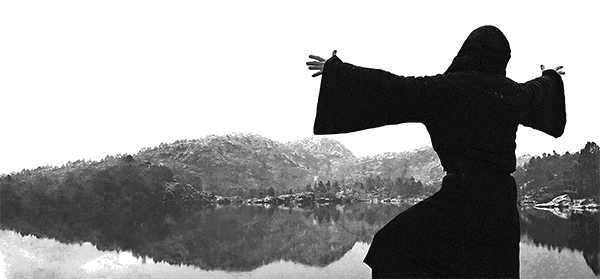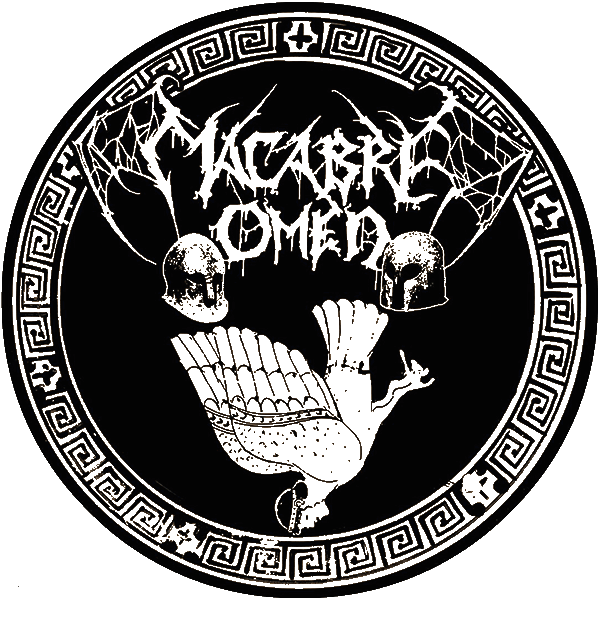Macabre Omen
2021-07-14
by Niklas Göransson
Macabre Omen carries Hellenic darkness from the Isle of the Sun. An anamnesis of the distant past with Rhodian underground diehard Alexandros Antoniou.
This is an excerpt from the full article, which is almost twice as long and published in Bardo Methodology #7. The same issue also includes conversations with BLACK WITCHERY, GOSPEL OF THE HORNS, THORYBOS, ANTEDILUVIAN, ATLANTEAN KODEX, MGŁA, Cold Meat Industry, MORTIIS, MONUMENTUM, WARLOGHE, ORDO TEMPLI AETERNAE LUCIS, and HEXVESSEL.
– After reaching an unimaginable twenty-five years since forming this band, as well as having now finally scaled the peak of the mountain called life, I decided to come up with something of a commemorative nature. I wanted a means of expressing both sorrow and triumph; closing one door before opening the next, so to speak. I believe this release will link all the past material up to “Gods of War – At War” (2015) with what’s to come.
Alexandros is referring to “Anamneses”, a compilation containing remastered demo and EP tracks from the mid-90s, released by Ván Records in August 2020. In the summer of 2019, he recorded a new song called “Anamneses from the Past (Sirens Calling)” as bonus material.
– In my eyes, this is no mere compilation. Far too much time, effort, and emotion have been plied into it. I don’t want this to be a waste of anyone’s time – neither for me, the artist, nor the admirer. I’m more inclined to regard this as a release which showcases the brand-new and exclusive track. The other songs on this… full-length mini-album, or whatever you want to call it, are all from the 90s and were originally released in a variety of mainly analogue formats. They’ve been remastered and, wherever possible, also remixed. The way I see it, this is the bonus material – it’s mainly there because of repeated requests.

Alexandros’ road to the metal underground was quite typical for someone of his generation – he grew up with hard rock and heavy metal and then gradually progressed into thrash, death, and eventually black metal. Somewhat less typical though, was his geographical predicament; Alexandros is from Rhodes, an island in the Aegean Sea, southeast of Athens and northeast of Crete.
– Rhodes, the ’Isle of the Sun’, with its array of historical sites to visit, is certainly a great place for inspiration – but not very good for getting hold of metal. Especially in the 90s; imagine the pain one had to endure just to find new music. Local record stores would only source vinyl from the biggest names, which was a good start. Acquiring underground releases demanded a totally different approach, extending far beyond ordering from record stores on mainland Athens. I managed to establish a variety of snail-mail contacts between 1992 to ’94. It got to the point where I, on a daily basis, would receive two entire bags of letter correspondence. I was writing with people and various obscure bands from all over the world, including South America. Trading promos, photos, and bios became a ritual in itself. Still to this day, I clearly remember the distant sound of the postman’s Piaggio Ciao early in the morning. The heavier the sound, the harder his moped would struggle, the more post I’d receive! I cannot imagine what was going through his head, delivering all those items to our small village.
Alexandros founded MACABRE OMEN with three friends in 1994. Underground ‘zines and personal correspondence kept him updated on the dramatic developments in Scandinavian black metal, which he followed with a keen interest. However, living on a remote island, there wasn’t much opportunity to engage in domestic anti-Christian terrorism.
– I think the most extreme anecdote was when the teacher of religious studies caught me drawing an early MACABRE OMEN logo in class. This resulted in a priest being called in to receive confessions from the entire high school, myself included. It seemed like an exorcism of some sort back then, quite an interesting experience. Needless to say, my father was none too pleased with this, but sometimes one has to go through trouble to get somewhere. I recall when we’d finally located a studio for our ’96 “Olympus” promo and we had to pretend to be a hard-rock band – otherwise, with our type of music, we’d never get anyone to record it. Everything ran smoothly up until I did the screaming vocals; the engineer literally dropped the coffee cup from his hands! This was also around the time I first got internet access and, through mIRC, found at least one contact from each country to tape-trade with.
mIRC was a software client with which one accessed IRC, or Internet Relay Chat – a text-only communication platform, hugely popular in the 90s. In terms of subcultures, this was the precursor to message boards and enabled thousands of underground fanatics to correspond with likeminded in other parts of the world without exchanging hand-written letters or racking up insane phone-bills. Alexandros describes it as a definite game-changer, one that not only opened a lot of doors for expanding his collection but also helped establish contact with bands for his label, Demonion Productions. Early releases included the KEEP OF KALESSIN demo as well as the first WARLOGHE EP.
– I remember one Swedish contact who provided me with the latest albums by bands such as VINTERLAND, DAWN, NAGLFAR, ABYSSOS, and whatever else was spawning over there. Those were the good old days – even though things would take a suspenseful amount of time to arrive, it was a far shorter wait than one would experience in the 80s. It gave you a chance to absorb an album in its entirety before moving on to discover something else. Last time I had this thrilling underground feeling was probably back in 1999; everything changed after that. Don’t get me wrong, there are still some spectacular releases coming out on a regular basis but, unfortunately, they are swallowed by a sea of crap. All the while, the elements that made this whole movement something special are now gone forever. Still to this day I prefer discovering new music in unorthodox ways, just to get that feeling flowing through my veins again. Although my collection has now reached some 20,000 individual items in all formats, I’m able to keep myself entertained through several means which might not be the norm in this day and age. I think this eventually shows in my projects because, for me, personally, word-of-mouth and self-discovery is and always will be the best tool out there for exposure.
I’ve gathered that Alexandros has at least a passing interest in Ancient Greek history. About 250 kilometres (155 miles) from Rhodes lies a small, uninhabited, and, at first glance, rather unassuming island called Dhaskalio. Archaeological studies on the site concluded in 2018 yielded discoveries which are now completely changing established views on prehistoric Greece. Nothing even remotely similar from this period has ever been found in the region before, and such advanced engineering skills wouldn’t be seen again for millennia. Four thousand years ago, rising out of the Cyclades archipelago, glistening in the sunlight and visible for tens of kilometres away, stood a massive pyramid encased with polished white marble. After what researchers consider ‘by far the largest prehistoric marine transport operation that has ever come to light anywhere in the world’ – collecting thousands of tonnes of marble from an island ten kilometres (6,5 miles) away – a mountain was terraformed into a massive stepped pyramid with sixty marble buildings arranged in six-metre wide terraces over six different levels. The summit had no actual constructions, but rather appears to have been designed as a ceremonial space. Activities at the site are estimated as early as 2750 BC, predating any known worship of gods in the Aegean Region. It’s interesting to note that the complex appears to have been built within the same hundred-year timespan as Stonehenge, the first Egyptian pyramids, and the legendary cities of the Indus Valley and early Mesopotamian kingdoms. As awe-inspiring as the exterior must have looked, the architectural and engineering skills on display inside are no less impressive. Excavators discovered not only a sophisticated island-wide system of drainage tunnels, but also evidence of advanced metallurgy: castes for copper daggers, spearheads, axes, pins, and so forth. In fact, metalworking appears to have been its primary purpose, from the beginning to the very end. This adds even more questions to a case already shrouded in mystery, seeing as how such an operation requires a proper supply and distribution chain. All raw materials would’ve had to have been imported and the finished product carried off through seafaring networks. Where to is anyone’s guess at this point. There must also have been major agricultural activity somewhere in the vicinity, to provide food for Dhaskalio’s inhabitants and workers. The kind of social structure allowing for the development and generation-spanning refinement of such esoteric and technical skills is not yet fully understood since it’s at odds with our current understanding of the era. The research team’s co-director, Michael Boyd of Cambridge University, stated, ‘Our investigation has been transforming our understanding of early Bronze Age Cycladic culture and suggests that these very early Greeks were organisationally, technically and politically much more advanced than previously thought.’
– Ancient Hellenic thematic topics of both historical and mythological nature have always been part of MACABRE OMEN’s lyrical backdrop. I find that era of history especially interesting, for a lot of reasons – including the fact that I was brought up learning about it. The Dhaskalio discovery is indeed intriguing and I’m sure it will contribute to the rewriting of certain historical facts. However, the early Minoan civilisation used to thrive during those times, so I’m not really surprised by this discovery; there was probably a lot of commotion and exchange of knowledge in those parts of the Aegean. Also, if the neighbouring Santorini island was indeed the birthplace of Atlantis, I would expect something more intricate than a mere draining system, haha!
Santorini is another island in the Cyclades, about fifty-six kilometres (34 miles) from Dhaskalio. It was host to the Minoan eruption of Thera around 1600 BC, which tore the island asunder and wreaked unimaginable havoc along nearby land by way of massive tsunamis. If the Dhaskalio pyramid was still intact by then, this deluge would’ve spelt the definite end for it. Santorini, known as Thera at the time, has been suggested as Plato’s Atlantis, though not based on much else than the fact that it was swallowed by the depths.
– Joking aside, it was a fascinating time in history with advanced ways of thinking; spawning philosophies and sciences more advanced than what came out of medieval Europe thousands of years later. A prime example as to how religion can oppress and move things backwards – something that can be seen up to this day.

This was an excerpt from the full article, which is almost twice as long and published in Bardo Methodology #7. The same issue also includes conversations with BLACK WITCHERY, MACABRE OMEN, THORYBOS, ANTEDILUVIAN, ATLANTEAN KODEX, MGŁA, Cold Meat Industry, MORTIIS, MONUMENTUM, WARLOGHE, ORDO TEMPLI AETERNAE LUCIS, and HEXVESSEL.



